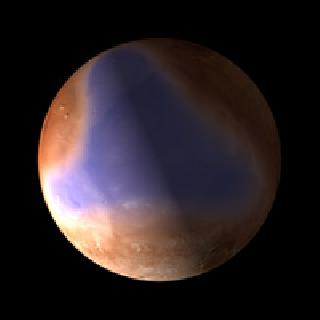
Ancient northern ocean on Mars. An ESA photo
PARIS (BNS): After a NASA spacecraft found striking evidence of flowing water on Mars last year, a European spacecraft now has detected what appears to be an ocean once covering part of the Red Planet.
The European Space Agencys Mars Express has come across sediments reminiscent of an ocean floor within the boundaries of previously identified, ancient shorelines on Mars.
The new features on the planet's surface have been detected by the spacecraft's MARSIS radar which was deployed in 2005 and has been collecting data ever since.
The radar has dug deep into the Martian ground, revealing the first 60-80 metres of the planet's subsurface. Throughout all this depth, the researchers believe they have found evidence of sedimentary material and ice.
"We interpret these as sedimentary deposits, maybe ice-rich. It is a strong new indication that there was once an ocean here," according to Jérémie Mouginot, Institut de Planétologie et d'Astrophysique de Grenoble (IPAG) and the University of California, Irvine.
After analysing the data sent by Mars Express for over two years, Dr Mouginot and colleagues have found that the northern plains of Mars are covered in low-density material.
Various spacecraft in the past have hinted at existence of ocean on ancient Mars but no concrete evidence has been provided for it yet.
Two oceans have been proposed on Mars -- 4 billion years ago, when warmer conditions prevailed in the planet; and 3 billion years ago when subsurface ice melted following a large impact, creating outflow channels that drained the water into areas of low elevation.
The presence of ocean, as suggested by Mars Express, appears to be a temporary one, where the water would have either frozen back in place and been preserved underground again, or turned into vapour and lifted gradually into the atmosphere within a million years or less, says Dr Mouginot.
"I don't think it could have stayed as an ocean long enough for life to form," the researcher says.
In August last year, NASA's Mars Reconnaissance Orbiter had spotted dark, finger-like features on Mars, hinting that streams of salty liquid water were still active on the planet.
The latest finding provides some of the best evidence yet that there were once large bodies of liquid water on Mars and is further proof of the role of liquid water in the Martian geological history.
In order to find evidence of life, astrobiologists will have to look even further back in Mars' history when liquid water existed for much longer periods, ESA said.
 Previous Article
Previous Article Next Article
Next Article













The Indian Air Force, in its flight trials evaluation report submitted before the Defence Ministry l..
view articleAn insight into the Medium Multi-Role Combat Aircraft competition...
view articleSky enthusiasts can now spot the International Space Station (ISS) commanded by Indian-American astr..
view article